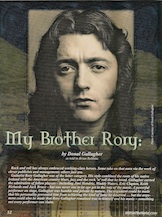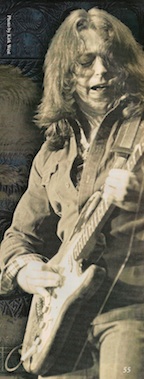Jul 19 2012
My Brother Rory: Part II
The following is Part Two of Brian Robbins conversation with Donal Gallagher published in the most recent issue of the music magazine Hittin’ the Note. Many thanks to John Lynskey, publisher of Hittin’ the Note, and Brian Robbins, the author of the article for allowing me to post this to my blog. You can order the latest issue of the publication through their online presence at: HittintheNote.com. And be sure to catch Brian’s previous reviews of the latest album Notes from San Francisco, the re-release of Rory Gallagher’s classic albums, and the Blu-ray DVD of Irish Tour ’74 on jambands.com.

My Brother Rory — Part Two
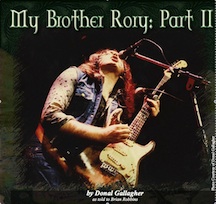
Rock and roll has always embraced working-class heroes. Some take on that aura via the work of clever publicists and management, others just are.
Guitarist Rory Gallagher was of the latter category. His style combined the roots of his native Ireland with the American country blues, jazz and the rock ‘n’ roll that he loved. Gallagher earned the admiration of fellow players – including Jimi Hendrix, Muddy Waters, Eric Clapton, Keith Richards and Jack Bruce – but was never one to let ego get in the way of the music. A powerful performer on stage, Gallagher was humble and private by nature. The argument could be made that his personality prevented him from achieving the kind of fame he deserved … but the argument could also be made that Rory Gallagher remained true to himself and his music – something not every performer can claim.
Rory Gallagher died in June 1995 at the age of 47 from complications following a liver transplant. The music he left behind will forever be fodder for “how did he do that?” discussions in guitar circles, and still continues to attract new fans. 2011 saw the re-release of Gallagher’s catalogue of classic albums (both studio and live) by Eagle Rock Entertainment, along with some great live performances on DVD and Blu-ray. Newly re-mastered (and including some previously-unreleased material), this new wave of music has something for both the uninitiated and the longtime Rory fan.
Rory’s brother Donal oversaw the re-release project, his duties carried out both as family and from the viewpoint of having been there himself.Throughout Rory’s career, Donal was by his side as his “road manager,” a title that hardly does his role justice. Perhaps “brother” is truly the best title of all. In Part I of “My Brother Rory” (HTN# 72) Donal shared some childhood memories of his life with Rory, took us along on the 1974 tour of Ireland documented on the amazing Irish Tour ’74 live album and DVD), and gave a detailed account of how Rory came this close to becoming a Rolling Stone. We continue with more of Donal’s wonderful stories.

The Rolling Stones’ 1975 courting of Rory wasn’t the first time a high-profile band had expressed interest in him. In 1968, Rory was leading the power trio Taste when the offer to join another three-piece outfit was extended. Says Donal…
In 1968, Rory’s band Taste was quite popular in the UK. In fact, they were asked to open for Cream’s final show at the Royal Albert Hall that November. Jack Bruce and Ginger Baker were both keen to carry on with Cream, but it was Eric Clapton that didn’t want to continue.
Robert Stigwood – who managed Cream at the time – was also Taste’s agent. It was Robert who put this feeler out that Jack and Ginger would be interested to have Rory join them in Cream, but Rory wouldn’t let the conversation go any further, “That was Eric Clapton – I’d be trying to stand in his shoes forever.” And he didn’t want that.
I could understand it. I knew exactly what Rory was saying. But at the same time, it was a shame that he and Jack were never able to be in a band together. Rory and Jack ended up being quite good pals and when they played together – boy! There was a connection – a sort of … Celtic improvisation where they could take the music beyond certain limitations. I know that Jack was really keen for Rory to come on board in Cream, but…
Jack and Rory did one session together that was filmed by German television – one of the Rockpalast shows. They played three or four songs: “Politician,” “Born Under a Bad Sign”… some Cream numbers, you know?
I have a recording somewhere of Jack on bass, Charlie Watts on drums, Ian Stewart on piano, Rory on guitar and a brass section. It was a fundraiser benefit that Jack put together up in Scotland – a charity deal. Obviously, with Charlie Watts on drums it wasn’t going to be a Cream sort of thing – it was more straight-ahead blues. Some really great music and fun time.
Along with last year’s re-release of Rory’s first six albums, Eagle Rock Entertainment gave us some never-before-heard Rory Gallagher. The sessions for Notes from San Francisco took place in 1977, but it took 34 years for them to see the light of day. Donal explains:
Rory’s heart and soul were in American music- and he had always wanted to record in the States. Rory switched labels to Chrysalis in 1975, and when they found out he was interested in recording in the States, they said, “Let’s make it happen.”
Rory had met producer Elliot Mazer a number of years before that – around the time that Elliot was working on Neil Young’s Harvest album. His studio was located in San Francisco, which was one of Rory’s favorite towns in the States – he loved to hang out there.
Elliot was recording The Last Waltz with the Band at Winterland on Thanksgiving of ’77. Rory had been invited to attend… but we ended up playing in Texas instead for ZZ Top’s Thanksgiving Day show! I don’t think Rory ever forgave me – he really wanted to be at The Last Waltz, but when you have a band on the road and you’re trying to break new territories and get the attention, then … well… ZZ Top in Texas was a major event at that time.
Rory finished the ’77 tour and went straight to San Francisco with material he’d written to start working on the album. As things progressed, it became more complicated for Rory – he wasn’t happy with things. The album was meant to be finished by Christmas, but Rory wanted to do more mixes. The band returned to Europe, but Rory stayed to work on the album.
In January, Chrysalis flew in 53 executives from all over the States to listen to the album – and I was to present it to them. Rory had the actual lacquer – the master – and I went to his hotel room to pick it up. That’s when Rory said, “This album isn’t going anywhere.”
We got into this discussion – I said, “Listen, can’t I just play a couple cuts for the record Company?” This was the one they were going to put everything into – they were planning a big push.
But Rory said, “No.”
I said, “You can’t be serious…” He held it over the trash bin and dropped it in. “That’s what I think of this album.” He said, “No one’s going to hear it.”
I lied my way through the meeting with all the executives, saying that something had happened to the disc overnight – Rory wanted to remix the album and needed a little more time with it.
In the meantime, Rory – knowing I was being crucified by the record company – had gone off to see Bob Dylan’s Renaldo and Clara movie! On the way back, the cab was stopped on a hill. When Rory got out, the door flew back and fractured his thumb! I got back to the hotel to all these messages: Rory’d had an accident; Rory was in the hospital; Rory’d broken his thumb. That immediately took two months out of the extra three we’d been given, as Rory couldn’t do anything with a fractured thumb.
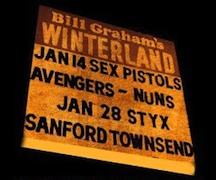
With that we returned home – and that’s when Rory disbanded the lineup he’d recorded the album with and went back to a three-piece band, keeping Gerry McAvoy on bass. You see, while he was in San Francisco trying to remix and remix and remix, the Sex Pistols came to town. Rory went to see them when they played at Winterland and I think it had a huge effect on him. Musically, it was a shambles – a complete shambles – but the excitement, the adrenaline, was what got to Rory. I think at that moment he may have felt the album was too orchestrated, if you like… and in his heart of hearts, he wanted to get back to the cut-and-chase of the three-piece band.
Part of it, too was a post-natal-like depression Rory was always in the throes of at the end of an album. He’d go back and remix or change the sequence of the tracks… he’d often be irritated at that stage. It was part of his personality. Plus, he was a workaholic.
Rory re-recorded a number of the songs with the new lineup and completely abandoned the San Francisco album, so it’s lain dormant for quite some time.
It took the next generation of musical Gallagher genes to bring Notes From San Francisco to live, according to Donal:
My son Daniel plays guitar – he had his own band and now works for our company, Strange Music. He heard the original San Francisco sessions and said, “This is terrific – why don’t you do something with it?” And I said, “Nahh…Rory didn’t want to fool with it,” but Daniel convinced me otherwise.
He brought in his friend Martin Dubka to remix the tracks – they thought with today’s technology they could cure a lot of what Rory didn’t care for at the time. I know Rory had issues with the studio itself in terms of Elliot having ripped everything out to record The Last Waltz. They put everything back, but it was never quite right – there were a lot of breakdowns and issues that irritated Rory.
Daniel then said, “I have these live tracks – Rory did five nights at the Old Waldorf in San Francisco in December of ’79 with the three-piece band. It’s amazing! How about if we combine the two albums – the studio and the live? It’ll be a good way to balance things.” To me, it was a nice way to justify putting the album out. And the more I listened to it, it’s spectacular playing – just lovely.
The ’80’s were tough for Rory Gallagher. His guitar skills were still much admired and respected by his peers, but his albums saw lackluster sales. And to make matters worse, he’d developed a bad habit – prescription tranquilizers.
Rory’s fear of flying had flagged itself up and his doctor gave him something for it. In hindsight, I think he was wearing too many hats and the pressure was getting to be too much. Rory was writing the songs, producing the records, trying to be his own manager. I think the “flying tablets” he’d been prescribed probably relaxed him, so he began to take them more often.
Of course, after a while they weren’t strong enough, so he’d go back to the doctor and upgrade. At the time, no one was aware of how much of a problem Rory had – he was very discreet.
The combination of Rory’s alcohol usage with his pill problem made for “a devil’s brew,” according to Donal. The resulting damage to Rory’s liver ultimately proved to be fatal, although he continued to play right up until the final months of his life. Rory went into a coma following a performance in the Netherlands in January of 1995. He received a liver transplant but a series of complications and subsequent surgeries made for some hard final months. Donal was at Rory’s side when he passed away on the 14th of June.
Was it a blessing in disguise? Who knows? Who knows what kind of life he would’ve had if he’d recovered from the transplant? It’s hard to say.
Looking back, I would have done some things differently. But at the same time, I don’t blame myself. You can’t change someone if they don’t want to change – and Rory could be stubborn. He wasn’t going to change for anybody… and you had to respect him for that.
Looking to the future, Donal addressed the state of the archives:
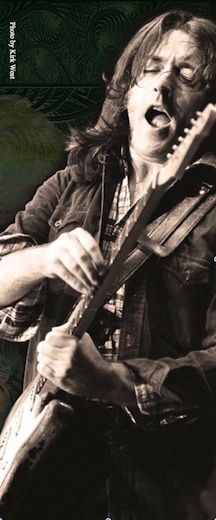
Rory did a lot of radio programs – particularly in America. Rory’s music wasn’t formatted for radio airplay – he didn’t release singles. The alternative to that was allowing the FM stations to come and record the live shows for broadcast. So by virtue of that – and by virtue of the fact that no two gigs were ever the same – we have a lot of tapes.
Rory educated us to look after the recordings in the archives. We had the tapes baked a couple of times to make sure there was no moisture, which can cause them to deteriorate. Plus, there are certain types of tapes that are inclined to break up and shatter, so sometimes we duplicated to a different source.
Of course, multi-track tape was quite expensive back in the day, so to economize, we’d oftentimes re-record over shows! I think some of the live tracks on Notes from San Francisco were over-recorded on tapes.
Tom O’Driscoll took over the archives after Rory died and has done a wonderful job of sorting and cataloguing everything. Plus, things show up just out of the blue. It’s fortunate that Daniel is around, as he’s of a different technical age than I am and tracks a lot of stuff – he’s quite diligent. For instance, he turned up this piece that was taped for French television that I’d completely forgotten had been done – I hadn’t been there for the taping. And that would’ve been something that I would never have known to look for.
Sadly, as is often the case, Rory Gallagher has become more well-known since his death – due in no small part to the efforts of his brother Donal. Talking to Donal, it’s obvious what drives him: pride and love.
Since Rory died, there are so many people who have said how much he influenced them and I’m proud of that … but it would’ve been nice if they could have done that while he was alive.
Whenever I’d say anything to Rory about people not paying enough attention to his music, he’d laugh it off.
“Look,” he’d say, “how many people know about Doc Watson? How many people appreciate Django Reinhardt? They’re far better guitarists than I am and they never get any recognition… I’m not complaining.”
But I always thought Rory deserved more… and that’s why we’re doing what we’re doing.
It’s a mission.
